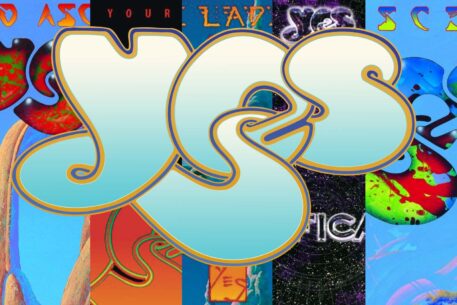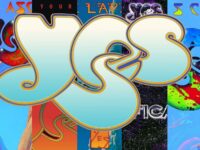John M. Gouldin is breaking down five less-heralded albums Yes released between 1996-2001 in a multi-part series, beginning with ‘Keys to Ascension’ and continuing now with ‘Open Your Eyes’:

Yes is a band with a 50-year catalog of sometimes-stunning progressive, pop, and rock music running through one score and three diverse albums. The background experiences involved with making that music is full of quirks and oddities, where events seldom unfolded in a linear fashion for too long.
Using a few of its nine lives dodging whatever a half-century could throw at it, Yes has been declared dead and prospered like Midas with every status in between, followed by fans and critics who have happily analyzed, quibbled over, and embraced this unique amalgam since Let It Be was new on shelves.
A fast, prolific period began in 1996 that saw a quick succession of albums, each as a response to separate sets of head-shaking circumstances, and each (treating Keys to Ascension here as one here) a very different musical representation of the band than the last.
The first major event involved two popular past members, guitarist Steve Howe and keyboardist Rick Wakeman reforming with current Yes members Chris Squire, Jon Anderson, and Alan White, with the intention of rebuilding a 21st century Yes using quality re-manufactured parts. By spring 1997, a reintroduction featuring this historic lineup, called Keys to Ascension, had been released, with Keys to Ascension 2 finished and waiting for an autumn release.
Indicators showed an old-school, new-style progressive Yes afoot on the music scene when shockingly, the entire endeavor fatally collapsed. Just as ticket started selling for a June tour, Wakeman abruptly decided to (again) depart, citing conflicting schedules with his own prodigious solo career. Announcements sounded decisive. As the tour dates canceled, the reunion was suddenly finished.
Thoroughly upended, the remaining four stood with no keyboardist nor business plan. Discord soon developed with their now-cautious record label who announced they would hold back the release of Keys to Ascension 2, viewing it as a dead end investment, marketing a non-existent concept.
The second half of the year moved just as fast as the first. Yes attained new management which naturally wanted new music to promote. The closest simile at hand were a few demos recorded by Chris Squire and a multi-talent named Billy Sherwood, a friend who had worked with the band in various capacities. Squire and Sherwood fashioned the demos with an eye toward an eventual side project, which they did later as Conspiracy.
Management convinced the band to use the demos as a starting point for a new album. A few were adapted into Yes songs and new ones written and recorded. Because of Sherwood’s deep involvement in all areas of the project, it became a natural requirement to make him an official band member as the record moved toward an early 1998 release date.
By autumn 1997, the old record label learned of the new album with the new label, now called Open Your Eyes, and rushed out its zombie Keys to Ascension 2 to piggyback on any attention. Learning of this intended action, the new label moved up their release date of Open Your Eyes before the year-end holidays.
This resulted in one of the many goofy idiosyncrasies embedded in the band’s then-29 year history: Two new albums, definitively Yes, each with a different lineup, musical style and production sound, competed directly against each other in the December record racks. Notably, this was the second time in YesHistory this happened. For greedy Yes fans who uncritically wanted new music, 1997 was a good Christmas season.
‘OPEN YOUR EYES’
Released: November 1997
Players: John Anderson, Alan White, Steve Howe, Chris Squire, Billy Sherwood
Producers: Yes
In a hard turn away from the music Yes physically created just a year ago, Open Your Eyes stomped into existence sounding more like 1994’s Talk than the pedantry of previous Keys to Ascension 2, apparently firm in its aspiration to resolve that frustrating cul-de-sac. In a popularity move, the group chose an album of big, bright, commercialized constructions.
Open Your Eyes quickly became one of the more contentious Yes albums, and remains so. Supporters like the pace and newly powerful harmonies. The LP exudes an upbeat force and obvious chops. For most, however, it is a braying, excessively layered production of rather average rock/pop.
Starting well by making a heavy point about a “New State of Mind” for about one minute too long, the listener is then assaulted by a propulsive title cut as processed and layered as a frozen pizza, yet shimmering atop an unconventional (for Yes) density. Sparkling, with a high-rev motor, hopes attached to it as a lead single and it lightly listed on rock charts, sounding competitive and new as it charged out of 1998 radios.
It’s probably the high point. Thereafter, light complexities stand in for prog here and there, but wide appeal is a higher priority. Sherwood’s “Universal Garden” and the zeitgeist of “Fortune Seller” help, but one imagines playing “Man in the Moon” or “No Way We Can Lose” only if skipping through a park. Jaunty Yes is not desirable.
Biases about the group in 1997 probably hurt the listening of this record, as happened when past member Trevor Rabin came on board and significantly altered the sound. The powered-up positivity has aged well and may appeal to those who don’t know YesMusic but at the time, it did nothing to compromise any divisions between on-line fans of the ’70s prog monolith (Troopers) and those who preferred the aerodynamic 90125 to Union era (Generators).
Recommending a re-listen to Open Your Eyes is easy and fun now that Billy Sherwood is back as permanent bassist (a few years now), and it can be brought alongside 2021’s The Quest, his latest with them. Kismet. Made in reaction to a sudden and calamitous situation that forced Yes in a completely unanticipated direction, Open Your Eyes can be viewed as a bridge or transitional recording and the group might not exist today had it not come forth.
As the album (well, both of them) dropped, Howe, White, Squire, Sherwood and Anderson started on a tour that itself contained a few Yes eccentricities. While the album sold only moderately, the tour stretched to an enormous 12 months, visiting almost 20 countries on four continents. It succeeded economically and musically, but they only occasionally played “Children of Light” from Keys to Ascension and almost nothing from Open Your Eyes. They sold tickets overwhelmingly on reputation. Little about Yes has a simple explanation.
This was the first tour to not have an official member on keyboards. Duties were filled by a found talent named Igor Khoroshev, who played on three Open Your Eyes studio songs and quickly turned into a popular gold-nugget concert addition. Vacating the frustrations of the aborted Keys to Ascension experience, Yes felt a welcome cohesion and energy after a year on the road, and decided to head directly into the studio at tour’s end in late 1998.
They could not have known that more substantial changes awaited, planned and unplanned.
Click here for John M. Gouldin’s four-part series on one of Yes’ most overlooked eras, with thoughts on ‘Keys to Ascension and Keys to Ascension 2,’ ‘Open Your Eyes,’ ‘The Ladder’ and ‘Magnification.’
- The Story of the Only Yes EP: ‘From a Page’ - August 18, 2023
- New Yes History: A Moment to Breathe, A Moment to Listen - May 15, 2023
- Returning to One of Yes’ Most Overlooked Eras: ‘Magnification’ - February 13, 2023


